- Home
- Simon Kernick
The Bone Field Page 4
The Bone Field Read online
Page 4
And it would. It always did. But not in here, not in front of them.
‘Is what I’ve just said about the events of tonight a fair summary of what happened?’ said Glenda.
I sighed. ‘I guess so.’
‘Well, is it or isn’t it?’
You see what I mean about Glenda? Sympathy tends to be in short supply in her neck of the woods. She was glaring at me again.
I glared back. ‘Yeah, it is. But what I don’t understand is why you’re implying that I somehow had something to do with these murders.’
‘No one’s implying that, DS Mason,’ said Taliban, using my formal title for the benefit of the tape.
‘Well, you know, Tom, I think they are. But you can check my phone records. I received an incoming call this evening from Maurice Reedman’s home phone. I didn’t call him. He called me.’
‘We’ve checked,’ said Glenda.
‘So why are you giving me all this grief?’ I asked her.
‘We’re just trying to ascertain what happened,’ said Taliban.
But they weren’t. I’d given them a full and frank witness statement. I’d described the gunman I’d fought with as best I could. I’d been through my whole conversation with Henry Forbes and his lawyer. And yet none of it seemed to be enough.
I sat back in my chair and spread my arms wide. ‘What more do you want from me?’ I asked them both.
‘You’ve been very cooperative,’ Taliban responded with what I think was a supportive smile from somewhere underneath the beard.
Glenda nodded slowly, putting on a pretence of looking very thoughtful. ‘It’s just the timings seem very coincidental. You get the call to go to the house at 19.11, and within a matter of minutes of you turning up, so do the three attackers. But somehow you manage to be outside talking when they do, having left the front door on the latch. It raises questions.’
‘What sort of questions?’
‘You have history, DS Mason. Last year you were found in a house with four dead police officers and two dead suspects, having grappled with a mystery killer, who subsequently escaped. You were also involved in an unauthorized operation on the same day that got your colleague killed.’
‘That’s got nothing to do with any of this. And the mystery killer you’re referring to has a name, and no one’s denying she was responsible for the deaths of those police officers.’
‘It’s just you always seem to be in the wrong place at the wrong time.’
‘We just have to make sure we go through everything with a fine-tooth comb,’ added Taliban diplomatically.
‘Well you have done,’ I told him. ‘We’ve been in here close to two hours now. I’ve told you everything I know. Yes, the timings are coincidental but there’s nothing I can do about that. Before tonight I hadn’t heard anything about Henry Forbes since I was thirteen years old. So what motive would I have for being involved in his murder?’
‘No one’s saying you have one,’ Taliban said.
‘But you’re not saying I haven’t. You’re treating me as a suspect, and I’ve had enough of it. I went to Reedman’s house in good faith and it almost cost me my life. Now, if there’s nothing else, I need to go home and get some sleep.’
The two of them looked at each other, then Glenda said, ‘There’s nothing else for now. Thank you for your time.’
I stood up and glared at both of them. ‘And if you find a motive for my involvement, let me know. I’d love to hear what it is.’
Glenda smiled for the first time in the interview. ‘Don’t worry,’ she said, ‘we will.’
Five
It was almost two a.m. when I finally walked, exhausted, through my front door.
I live in a modern six-storey block of apartments in fashionable Fulham. The building’s not pretty. It’s all glass and strange angles, and ordinarily I wouldn’t have even thought about buying a place somewhere like this, but it has something I covet. Security. There was an attempt on my life three years back outside my old place in King’s Cross and ever since then I’ve been paranoid. Only the most determined and clued-up intruder’s going to get into my place now. There are two entrances – one from the street, and one from the underground garage – both protected by hi-tech, heavily fortified security doors. Access is by fingerprint only, so only residents and carefully vetted staff can get in. For most of the residents the security is probably overkill. Fulham’s a comparatively low-crime area and it’s not even as if the people who own the apartments are multi-millionaires. For the most part they’re city workers and other high-paid professionals.
But for me the security isn’t overkill. As well as the attempt on my life, there’s also an outstanding contract on my head. Over a decade ago, while I was still in military intelligence, I was involved in a sting operation against a Saudi Arabian radical looking to buy nerve gas for al-Qaeda, which had ended with the radical and his brother being killed. Fast forward to last year, and the radical’s brother, a very successful businessman, hired a female assassin known as The Wraith to kill everyone involved in that sting. She’d done a good job too, taking them out one by one. And then on a single bloody day last year, she’d killed two of my colleagues, including one who was my oldest friend, and come very close to killing me as well. That was what DI Glenda Gardner had been referring to when she’d talked about the house full of dead bodies I’d been discovered in.
It seemed I was a man very long on enemies and very short on friends.
My earlier hunger had gone now. I just felt empty. And in need of a drink. I grabbed an open bottle of red wine from the fridge and poured myself a big glass. My hands were shaking as I raised it to my lips and drank greedily. The shock of staring down a gun barrel, thinking I was about to die, was beginning to kick in, the earlier adrenalin now a distant memory. It was a pity, I thought ruefully, that I hadn’t developed the shakes earlier, in the interview room.
My mobile rang. It was Olaf.
‘I heard it got a bit heated with Glenda,’ he said. ‘I know what she can be like.’
‘Yeah, but tell me I’m not a suspect, boss. As soon as I got the call from Forbes’s lawyer last night I called you.’
‘You’re not a suspect, Ray. But this is a big case. We’ve got two bodies here, and two more over in Thames Valley, and it looks like they’re connected. Plus, there’s a potential conflict of interest with your involvement, so I’ve got to get clearance from above that you can still work on it.’
‘You need every man you’ve got on this, boss. And one thing you can say about me is I’m a good detective.’
‘I know you are, Ray, and I want you on it. But take a lie-in tomorrow morning, OK? And wait for me to sort everything out my end.’
I sighed. ‘Don’t push me out. Please.’ I almost added that it was personal now, to nick the guy who’d tried to kill me, but I figured saying that wasn’t going to help.
‘Leave it with me. Sleep well, and don’t have nightmares.’ He ended the call with a loud chuckle, and I put down the phone, thinking that, right now, things couldn’t get much worse for me.
But in that I was very, very wrong.
Day Two
Wednesday
Six
The world looked a lot better for Charlotte Curtis in the daylight. The southern French sky was a watery blue and the sun was already shining brightly across the valley. Charlotte stood on the back patio with a mug of strong coffee in her hand, looking out past the swimming pool and across the narrow valley to the wooded hills beyond. It was a view she never tired of and she was determined not to allow the shock of last night to get the better of her.
She’d already been online this morning to order a bug finder from Amazon. The one she’d got could apparently locate any kind of spy camera or listening device so if the pervert who’d been filming her had planted anything else in her house she was going to find it. She’d also bought up-to-date anti-virus software for her PC. She’d read somewhere that criminals could install viruses on your c
omputers, sometimes remotely, which allowed them to access all your files and see exactly what you were looking at while online. She’d run a check and so far, thankfully, nothing unusual had shown up.
But the fact remained that someone had broken into her house, drilled a hole in her bathroom ceiling, and placed a spy camera inside. Even standing out here in the sunshine, the thought still made her skin crawl.
Kado was running round her feet, eager for a decent walk. She always took him out for at least half an hour before school come rain or shine, and now that she was in the Easter holidays, he usually got an hour down in the valley before Charlotte got on with her day. But the valley was quiet and isolated and people rarely walked down there, and this morning Charlotte hadn’t wanted to go. Someone was watching her. He might have been watching her down there every day as she and Kado walked. The thought both terrified and angered her. It was the violation of her privacy, of her space, and the worst part was that she had absolutely no idea who it was, and until she knew, every man around here would be under suspicion.
Charlotte knew she needed to get out of the house and experience some normality. She needed to talk to someone about her discovery as well. The police, obviously, but also her friends in the village. They might know what to do. But she was a private person. She didn’t like the idea of involving other people in something like this. In the end, she wasn’t close enough to any of them, even though she knew they all cared about her. Jacques would have known what to do, she thought ruefully; he would have protected me. She allowed herself a moment of maudlin reflection before deciding that she’d call the police later. In the meantime, she’d take a drive into the village for some supplies.
Charlotte had fallen in love with this area of France, a beautiful stretch of country roughly halfway between Bordeaux and Toulouse, as soon as Jacques had brought her here to meet his family. At the time they’d only known each other a few months but they were very much in love and Charlotte had known deep down that he was the man for her. The thought of an idyllic, romantic life in rural France appealed to her far more than it did to Jacques, though, who’d grown up there and found it far too peaceful for his liking. He liked the life they’d carved out for themselves in swinging Brighton where he ran his own small building company and they had a wide circle of friends. Eventually, though, Charlotte had persuaded him to return with her to the land of his childhood. She’d learned French, found a job at a village school about twenty miles south of his parents’ place, and they’d never looked back.
Sometimes Charlotte liked to ride her bike into nearby Roquecor but today she took the car, parking in the shade of a cypress tree at the edge of the village. She bought bread, cheese and fresh milk from the village shop before settling down for a coffee at Roquecor’s one and only bar/restaurant. The sun was pleasantly warm so she sat at one of the outside tables with her cup and a pastry, watching the world go by. Late morning in the village, especially outside the tourist season, was extremely quiet. The odd car came past, a couple of kids played with a tennis ball at the end of the street, and an old lady Charlotte recognized as Madame Mennalle sat on a chair outside her house, basking in the sunshine.
Who was spying on her? It was a question she found impossible to get out of her head. It had to be someone local. Could it possibly be Lucien? You heard about those internet dates that went terribly wrong, and, really, how well did she know him? Even so, she couldn’t quite believe it. As she sat with her coffee she tried her best to work out whether he’d ever had a chance to steal her keys during their time together, and concluded that he almost certainly hadn’t.
With a sigh, she paid for her coffee and pastry and got back in the car, deciding that she’d drive into Agen this afternoon with the offending camera and file a report with the police. At least then she would feel like she was doing something.
As she pulled away from the kerb, the news came on the English-speaking radio station she was tuned into. She wasn’t really paying much attention to it until she heard the newsreader mention the name of Henry Forbes, describing him as one of two men shot dead in London in a gun attack the previous night.
Charlotte turned up the volume but the newsreader was already on to another story. Surely, she thought, it couldn’t be the Henry Forbes, the man she’d known so well a long time ago? After all, it wasn’t that uncommon a name, and she couldn’t imagine anyone wanting to shoot dead the Henry Forbes she knew. He might have been a pain in the backside and an egotistical, narcissistic arsehole – at least when she’d known him – but he wasn’t the sort to get involved in anything that might lead to his murder.
Charlotte drove home quickly and immediately went online, googling the words Henry Forbes shooting. There were at least a dozen stories outlining the previous night’s killings. Two of them mentioned the fact that Forbes’s body had been set on fire by his killers after he’d been shot. Charlotte shuddered. What kind of animals would do something like that?
There were no pictures of either of the murder victims but one of them was apparently Henry Forbes’s lawyer, a Maurice Reedman.
Reedman. The name rang a bell.
She tried to remember where she knew it from, then the answer hit her. Reedman had been the name of Henry’s family lawyer.
‘Oh Jesus Christ,’ she whispered. It was him.
Seven
At the time Kitty Sinn went missing in 1990, the media had one particular photo of her they liked to use. It was an upper body shot, taken outside on a summer’s day. Kitty was wearing a simple white dress and her dark hair fell down around her shoulders. She had slim features and a very small button nose, giving her the appearance of a young Audrey Hepburn. In the photo she was wearing a wide smile and her brown eyes were alive and bright. She looked like the kind of girl other girls would like because they wouldn’t feel threatened by her, and men would rush to protect. Looking back on the case now it was no wonder that it had garnered as much media attention as it had done. Kitty Sinn was the classic girl next door, someone who even those who’d never met her would warm to immediately.
And yet it looked like a young Henry Forbes and an unknown number of co-conspirators had murdered her along with, it seemed, a younger girl – a girl who, according to Olaf, had had her throat cut.
Why?
It’s the burning question that lies at the heart of any murder investigation. Motive. And whatever the motive for these murders was, it appeared anything but straightforward.
I was pondering this as I sat in DCI Olafsson’s office at 10.30 a.m. on day two of the Henry Forbes murder inquiry, looking at that old photo of Kitty on my mobile phone. Apparently, for the moment at least, I was allowed to continue working on the case, although Olaf had suggested when he’d called me an hour earlier that certain (so far unspecified) rules would apply, and when I’d walked through the open-plan incident room the reaction from the rest of the team had been muted to say the least. A few hellos and how-you-doings from the DCs; a stern nod of recognition from Taliban Tom, who always liked to keep his options open; and a predictable blanking from DI Glenda, who clearly didn’t think I should be there.
Don’t get me wrong. I hadn’t expected a hero’s welcome. I’m a loner at the best of times, and I’m not close to any of them. But even so, given the fact that I’d almost been shot the previous night, and I was officially not a suspect, I was hoping for a little bit more of a welcome from my fellow officers.
But there you go. At least Olaf seemed pleased to see me. It was just me and him in the office with the door closed, drinking decent-quality coffee from the percolator on his desk, while outside the hunt for evidence against the perpetrators of last night’s double murder had begun in earnest. It was almost certain that the murders were linked to Kitty Sinn’s, but right now the emphasis was on the far more mundane task of checking CCTV footage, phone records and the profiles of known offenders in an effort to come up with hard evidence as opposed to vague theories.
Olaf sighed and picked u
p an old file from his desk. ‘I’ve just been on to Thames Valley. They’ve now confirmed that the first remains found at the school belong to Kitty Sinn. So, as we suspected, Forbes was telling the truth. As for the other body, they’ve said it’s a girl called Dana Brennan. Dana went missing from a village called Frampton in Hampshire in July 1989. She lived with her parents and sister about three quarters of a mile outside the village limits and she was on her way back from the village shop on her bike when she disappeared. Her bike was found in bushes only a few hundred metres from home.’ Olaf took a deep breath and stared hard at me, and I could tell that the details of the case had got to him. ‘She was thirteen years old.’
The details of the case got to me too. I may not be emotionally involved in many things but violence against children has always been something I’ve found hard to take, perhaps because of what happened to me all those years ago. One of the reasons I’d concentrated on counter terrorism and organized crime during my career was that it meant I could avoid having to deal with child abusers and, God forbid, child killers, the lowest of the low.
‘Do you remember the Dana Brennan case?’ asked Olaf.
I shook my head. ‘Only very vaguely. The name rings a bell but I was only twelve in 1989.’
He sipped his coffee thoughtfully. ‘Fuck, I remember it. Her parents were always on TV appealing for whoever had taken her just to bring her home. And as the weeks passed you could see them getting thinner and more exhausted. It was almost like they were fading away. And then the news coverage faded away as well. Like it always does.’ He paused. ‘But I’ve never forgotten their desperation. The sheer pain they were in. It broke my heart, it really did.’
I knew that Olaf had three kids from two different marriages, the youngest a boy of just five he doted on, so it didn’t surprise me he felt that way. I could imagine that losing a child would be any parent’s worst nightmare. It’s one of the reasons I never had kids. So I could protect myself from the pain before it happened. If you don’t get too involved with people, their suffering can’t hurt you.

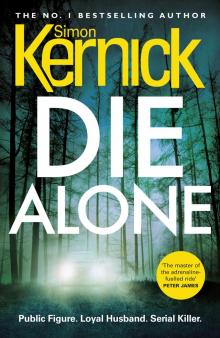 Die Alone
Die Alone Deadline
Deadline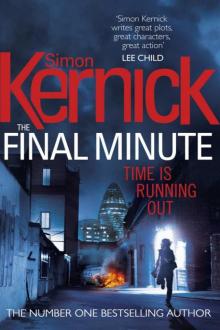 The Final Minute
The Final Minute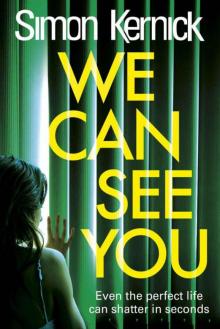 We Can See You
We Can See You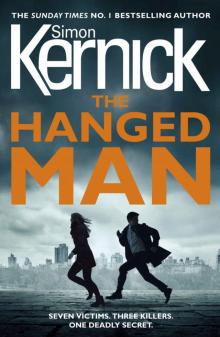 The Hanged Man (Bone Field 2)
The Hanged Man (Bone Field 2)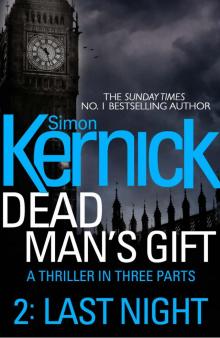 Dead Man's Gift 02 - Last Night
Dead Man's Gift 02 - Last Night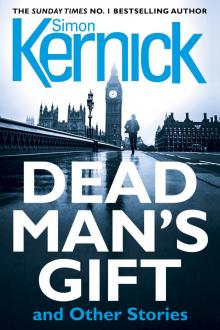 Dead Man's Gift and Other Stories
Dead Man's Gift and Other Stories A Good Day To Die
A Good Day To Die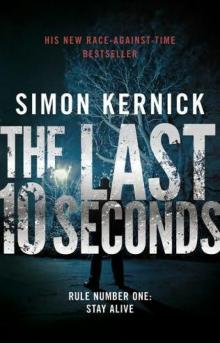 The Last 10 Seconds
The Last 10 Seconds The Murder Exchange
The Murder Exchange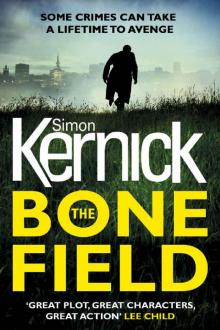 The Bone Field
The Bone Field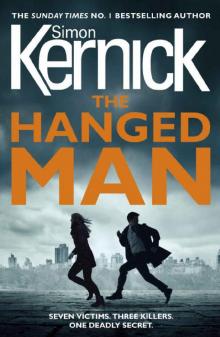 The Hanged Man
The Hanged Man Target
Target The Last 10 Seconds: A Novel
The Last 10 Seconds: A Novel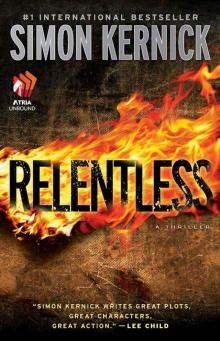 Relentless: A Novel
Relentless: A Novel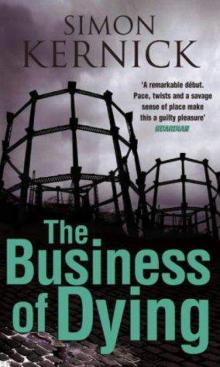 The Business Of Dying
The Business Of Dying Die Twice
Die Twice Flytrap
Flytrap Stay Alive
Stay Alive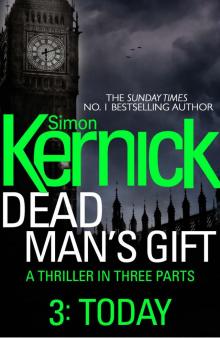 Dead Man's Gift 03 - Today
Dead Man's Gift 03 - Today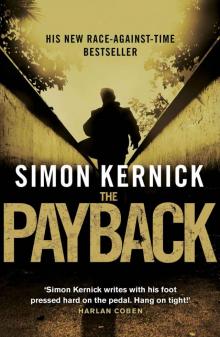 The Payback
The Payback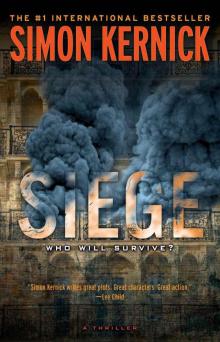 Siege: A Thriller
Siege: A Thriller The Crime Trade
The Crime Trade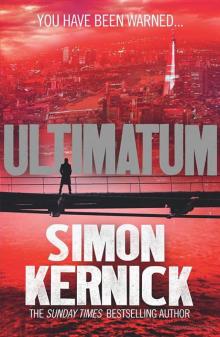 Ultimatum
Ultimatum